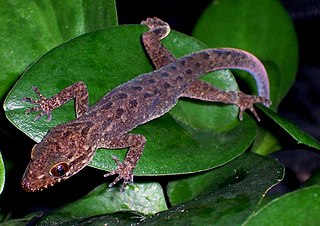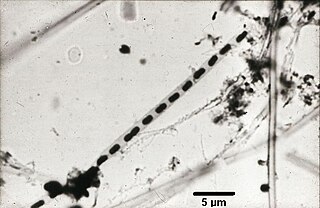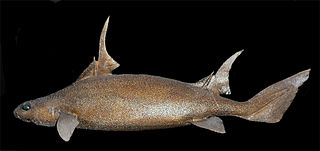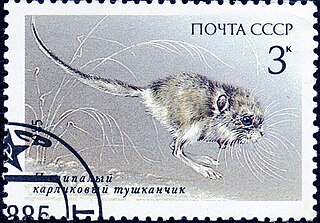
Cyrtodactylus is a diverse genus of Asian geckos, commonly known as bent-toed geckos or bow-fingered geckos. It has at least 250 described species at present, which makes it the largest of all gecko genera.

The Pallas's sandgrouse is a medium large bird in the sandgrouse family named after the German zoologist Peter Simon Pallas. The scientific name is from Ancient Greek. The genus Syrrhaptes is from surrhaptos, "sewn together" and paradoxus is from paradoxos, "strange".

Gekkoninae is a diverse subfamily of the family Gekkonidae, geckos. It has the most species and genera — over 850 species in 60 genera. Hemidactylus and Cyrtodactylus together account for 185 species.

The Comamonadaceae are a family of the Betaproteobacteria. Like all Proteobacteria, they are Gram-negative. They are aerobic and most of the species are motile via flagella. The cells are curved rod-shaped.
Pulsus paradoxus, also paradoxic pulse or paradoxical pulse, is an abnormally large decrease in stroke volume, systolic blood pressure and pulse wave amplitude during inspiration. The normal fall in pressure is less than 10 mmHg. When the drop is more than 10 mmHg, it is referred to as pulsus paradoxus. Pulsus paradoxus is not related to pulse rate or heart rate and it is not a paradoxical rise in systolic pressure. The normal variation of blood pressure during breathing/respiration is a decline in blood pressure during inhalation and an increase during exhalation. Pulsus paradoxus is a sign that is indicative of several conditions, including cardiac tamponade, chronic sleep apnea, croup, and obstructive lung disease.

Cyrtodactylus collegalensis, also known as the Kollegal ground gecko or forest spotted gecko, is a species of gecko found in and around Mysore hills, at the junction of the Western Ghats and the Eastern Ghats, in South India. Recent taxonomic works and genetic studies revealed that the formerly-supposed genus is actually a subgenus of the widespread genus Cyrtodactylus. It is often confused with the forest spotted gecko.

Liaoningosaurus is an unusual genus of ankylosaurian dinosaurs from the Early Cretaceous period of China. It contains a single species, Liaoningosaurus paradoxus, and is represented by two fossil specimens collected from the Yixian Formation of Liaoning Province. L. paradoxus was unusual among advanced ornithischian dinosaurs in that it is speculated to have hunted or scavenged, with preserved gut contents showing that it may have eaten fish. Additionally, some features of its skeleton may suggest that it was partially aquatic.

The Hispaniolan solenodon, also known as the Haitian solenodon, or agouta, is a solenodon found only on Hispaniola, the island shared by Haiti and the Dominican Republic. It was first described by Brandt in 1833. A similar but smaller species, Marcano's solenodon, once lived on the island, but became extinct after European colonization.

The sailfin roughshark is a species of dogfish shark in the family Oxynotidae, found in the eastern North Atlantic from Scotland to Senegal between latitudes 61°N and 11°N, at depths of between 265 and 720 m. Its length is up to 1.2 m (3.9 ft).

Idiosepius paradoxus, also known as the northern pygmy squid, is a species of bobtail squid native to the western Pacific Ocean, including the waters off South Korea, northern Australia, as well as the Japanese islands of Honshū, Kyūshū, and southern Hokkaidō. It inhabits shallow, inshore waters.
The Nicaraguan harvest mouse is a species of rodent in the family Cricetidae. It is found in Costa Rica and Nicaragua.

The five-toed pygmy jerboa is a species of rodent in the family Dipodidae. It is monotypic within the genus Cardiocranius. It is found in China, Kazakhstan, and Mongolia.
The paradox vole is a species of rodent in the family Cricetidae found in southern Turkmenistan.
Austroperipatus is a genus of velvet worms in the Peripatopsidae family. They are found in Queensland, Australia.

Doi Inthanon National Park, nicknamed "the roof of Thailand", is in the Thanon Thong Chai Range, Chom Thong District, Chiang Mai Province, northern Thailand. It includes Doi Inthanon, the country's highest mountain. Established in 1972, it is 482 square kilometres (186 sq mi) in size.
Paropta paradoxus is a species of moth of the family Cossidae. It is found on Cyprus and Rhodes and in Lebanon, Syria, Egypt, Saudi Arabia, Israel, Iran and Jordan.

Cyrtodactylus philippinicus, commonly known as the Philippine bent-toed gecko or Philippine bow-fingered gecko, is a species of gecko in family Gekkonidae.

Fukuivenator is an extinct genus of coelurosaurian theropod dinosaur from the Early Cretaceous of Japan.
Austroperipatus paradoxus is a species of velvet worm in the Peripatopsidae family.
Mykola Mykolaiovych Szczerbak was an Ukrainian zoologist and ecologist, a prolific herpetologist, a full professor and a Corresponding Member of the National Academy of Sciences of Ukraine.













